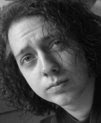"No mask," she said, "no pain."
Her nurse promised to give her enough morphine to deaden any pain she might feel after my mother made her choice: She would take off the mask. She would go now. I told the doctor and then ran sobbing—no longer trying to hold it together—into the waiting room to get my stepfather, my sister, and my aunt. Things were worse than they were five minutes ago. Get in here, I said, get in here now.
We said our good-byes—doesn't that sound dignified? But her mask was still on and her body still convulsing. Good-byes reduced my affable stepfather to wracking sobs; good-byes sent me and my sister falling to the floor beside our mother's deathbed. We held a phone up to my mother's ear so she could hear one of my brothers shout his good-bye over the whir and thump of the oxygen machine, while we tried desperately to get my other brother on the phone.
. . .
Then my mother was ready. The mask came off, she held tight to our hands, and the morphine went in. Her grip slackened. My mother was still alive, in there somewhere, beyond our reach. Was she in pain? We don't know. She couldn't talk to us now, or focus on us, but she was awake, her eyes open. She gasped for breath, again and again, and we sat there, traumatized, waiting for her heart to stop, waiting for the very first sound that I had ever heard—my mother's heart beating—to go silent.
. . .People must accept death at "the hour chosen by God," according to Pope Benedict XVI, leader of the Catholic Church, which is pouring money into the campaign against I-1000.
The hour chosen by God? What does that even mean? Without the intervention of man—and medical science—my mother would have died years earlier. And at the end, even without assisted suicide as an option, my mother had to make her choices. Two hours with the mask off? Six with the mask on? Another two days hooked up to machines? Once things were hopeless, she chose the quickest, if not the easiest, exit. Mask off, two hours. That was my mother's choice, not God's.
Did my mother commit suicide? I wonder what the pope might say.
I know what my mother would say: The same church leaders who can't manage to keep priests from raping children aren't entitled to micromanage the final moments of our lives.
. . .
If religious people believe assisted suicide is wrong, they have a right to say so. Same for gay marriage and abortion. They oppose them for religious reasons, but it's somehow not enough for them to deny those things to themselves. They have to rush into your intimate life and deny them to you, too—deny you control over your own reproductive organs, deny you the spouse of your choosing, condemn you to pain (or the terror of it) at the end of your life.
The proper response to religious opposition to choice or love or death can be reduced to a series of bumper stickers: Don't approve of abortion? Don't have one. Don't approve of gay marriage? Don't have one. Don't approve of physician-assisted suicide? For Christ's sake, don't have one. But don't tell me I can't have one—each one—because it offends your God.
Fuck your God.
Solange wir nicht selbst entscheiden dürfen, wie wir sterben, leben wir nicht in völliger Freiheit. Kein Staat der Welt hat das Recht, einem Menschen einen würdevollen Tod nach eigenem Willen zu verweigern.
Menschenwürde ist keine Leihgabe eines höheren Wesens, kein geborgtes Gut, das jederzeit entzogen werden kann. Sie ist in uns, unveräußerbar, unser einziger innerer Besitz, von der Geburt bis aufs Sterbebett.
